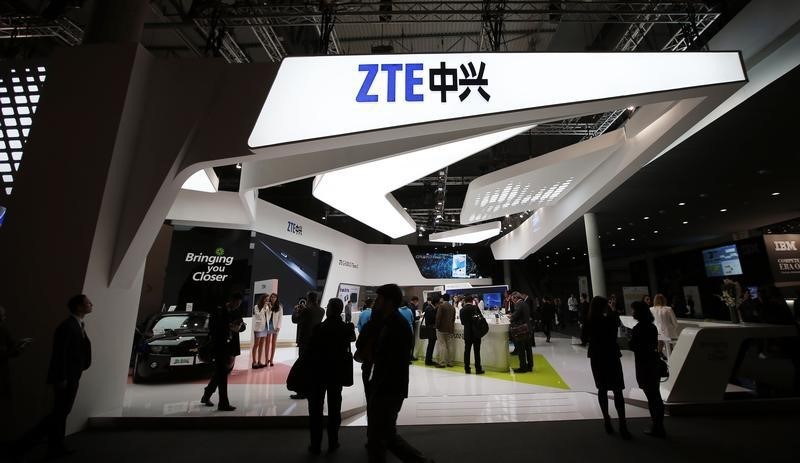By Joel Schectman and Susan Heavey
WASHINGTON (Reuters) - A new U.S. export restriction against China's ZTE Corp <000063.SZ> for alleged Iran sanctions violations is likely to disrupt the telecom manufacturer's sprawling global supply chain and could create substantial parts shortages, according to sanctions experts.
Under the measure announced by the Commerce Department on Monday, ZTE, which is a major global supplier of telecom-networking equipment, U.S. manufacturers will be banned from selling components to ZTE. In addition, foreign manufacturers will be prohibited from selling products containing a significant amount of U.S.-made parts to the Chinese company.
The Commerce Department, confirming the decision that was first reported by Reuters on Saturday, said ZTE planned to use a series of shell companies “to illicitly reexport controlled items to Iran in violation of U.S. export control laws." It said ZTE acted "contrary to the national security or foreign policy interests of the United States."
While ZTE suppliers can apply for an export license to ship any American-made equipment or parts, the Commerce Department said such license applications generally will be denied.
The export restriction, which does not stop ZTE from selling handsets in the United States, is expected to have a global impact.
“It is going to have a large ripple effect. It’s very significant to many companies both in the U.S. and [outside the] U.S.,” said Doug Jacobson, an export attorney at law firm Jacobson Burton Kelley PLLC, who said he has been fielding calls from clients who supply ZTE since Reuters broke news of the impending export restrictions.
For example, a Taiwanese chipmaker that uses American-made components to make processors for ZTE handsets would likely have to cut off those sales. If the Taiwanese supplier only procures components from outside the United States it can continue to sell to ZTE, experts said.
“I am telling all my clients today that anything (for ZTE)not already on board an airplane going to China, you cannot ship it starting tonight. They have to scrub and screen their customers lists – pending orders and future orders – to make sure that any transactions with ZTE are flagged and stopped.”
ZTE, which has annual sales of more than $15 billion and is the only Chinese smartphone maker with a meaningful presence in the U.S. market, can appeal the decision.
ZTE is among the largest companies that the Commerce Department has hit with a near-total export ban, according to public records. In 2014, the department restricted exports to Russian energy companies Lukoil OAO and Gazprom (MCX:GAZP) OAO, but those restrictions only stopped American companies from supplying certain types of oil-production projects, such as Arctic offshore and deepwater drilling.
EFFECT ON HANDSET PRODUCTION
ZTE is the No. 4 smartphone vendor in the United States, with a 7 percent market share, behind Apple Inc (O:AAPL), Samsung Electronics Co (KS:005930) and LG Electronics Inc (KS:066570), according to research firm IDC. It sells handset devices to three of the four largest U.S. mobile carriers - AT&T (N:T), T-Mobile US (O:TMUS) and Sprint Corp (N:S).
Although ZTE is not being banned from selling handsets in the United States, the restriction could disrupt handset production if ZTE sources U.S.-made parts to manufacture its handsets, experts said.
AT&T declined to comment, and T-Mobile and Sprint did not respond to requests for comment.
A ZTE website states that several leading U.S. technology companies, including Microsoft (O:MSFT), Intel Corp (O:INTC), IBM (N:IBM) and Honeywell International Inc (N:HON), are "key strategic partners." The terms of the partnerships are not described.
Intel and Qualcomm confirmed they were ZTE suppliers, but did not elaborate on specific products sold to the Chinese company or how sanctions would affect their businesses.
Texas Instruments (O:TXN), which has also said it provides processors for the Chinese company, did not immediately respond to a request for comment.
The impact of the new restrictions on these three companies was not immediately clear as most of them produce components both in the United States and overseas.
A spokeswoman for Microsoft said the company had a licensing agreement with ZTE but could not confirm if the Chinese company purchases other products, such as software. The other U.S. companies did not respond to requests for comment.
The U.S. decision could even prompt suppliers to halt the sales of non-U.S. components that are still allowed, said Kay Georgi, an export attorney at law firm Arent Fox LLP.

"When you get placed on one of these lists nobody wants to do business with you at all," Georgi said. "They just write you off."
The United States has long banned the sale of U.S.-made technology products to Iran as part of its sanctions, even as China maintains close diplomatic, economic, trade and energy ties with the Tehran government. Last year, the United States and major world powers reached a deal with Iran to loosen economic sanctions in exchange for Tehran curbing its nuclear program.
"We hope this sends a strong message to ZTE, to China, and to other Chinese telecommunications companies who present serious national security risks not only by evading export controls, but by purposefully compromising supply chain security," said U.S. Representative Adam Schiff of California, the top Democrat on the House of Representatives Intelligence Committee.